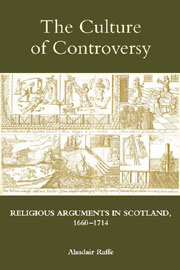Book contents
- Frontmatter
- Contents
- List of Maps and Illustrations
- Acknowledgements
- Abbreviations and Conventions
- Map 1 Scottish counties
- Map 2 Presbyteries, 1660–1714
- Introduction
- Part I Controversial Discourse
- 3 The Covenants and Conscientious Dissent
- 4 Persecution
- 5 Fanatics and Enthusiasts
- 6 Clerical Reputations
- Part II Controversial Action
- Conclusion: Concepts and Consequences
- Glossary
- Bibliography
- Index
- STUDIES IN MODERN BRITISH RELIGIOUS HISTORY
3 - The Covenants and Conscientious Dissent
from Part I - Controversial Discourse
Published online by Cambridge University Press: 05 February 2013
- Frontmatter
- Contents
- List of Maps and Illustrations
- Acknowledgements
- Abbreviations and Conventions
- Map 1 Scottish counties
- Map 2 Presbyteries, 1660–1714
- Introduction
- Part I Controversial Discourse
- 3 The Covenants and Conscientious Dissent
- 4 Persecution
- 5 Fanatics and Enthusiasts
- 6 Clerical Reputations
- Part II Controversial Action
- Conclusion: Concepts and Consequences
- Glossary
- Bibliography
- Index
- STUDIES IN MODERN BRITISH RELIGIOUS HISTORY
Summary
Arguments about the National Covenant (1638) and the Solemn League and Covenant (1643) played a central role in Scottish religious controversy after 1660. For presbyterians, these oaths were of lasting significance, statements of Scotland's relationship with God and commitment to presbyterian principles. As they struggled to uphold the Covenants in the face of aggressive government opposition, presbyterian dissenters faced trials of conscience and internal division. Their episcopalian opponents believed that the Covenants were no longer relevant; some alleged that they had been illegal oaths. Students of the Restoration period have found these debates hard to ignore, and yet in the standard histories of religious policy, contemporaries' attitudes towards the Covenants remain in the background. Moreover, some scholars of the period after 1690 have questioned the importance of the Covenants. Other historians have demonstrated that presbyterians upheld the oaths well into the eighteenth century, and that the legacy of the Covenanting period became increasingly contested. This chapter surveys the arguments surrounding the Covenants from the Restoration to the death of Queen Anne. It shows that presbyterians and episcopalians continued to quarrel about the Covenants, and argues that the difficulties of remaining true to these oaths became a source of controversy within presbyterianism.
The National Covenant was a declaration of religious and constitutional principles, signed first by Scotland's elites, and then on a national basis. It was a revolutionary rebuff to the policies of Charles I, the most provocative of which was his imposition of a Prayer Book on the Church in 1637.
- Type
- Chapter
- Information
- The Culture of ControversyReligious Arguments in Scotland, 1660-1714, pp. 65 - 92Publisher: Boydell & BrewerPrint publication year: 2012



